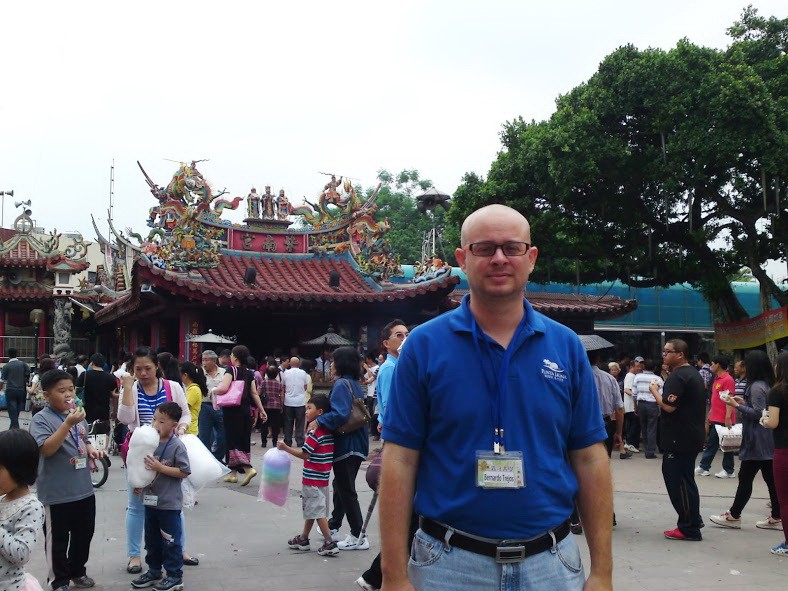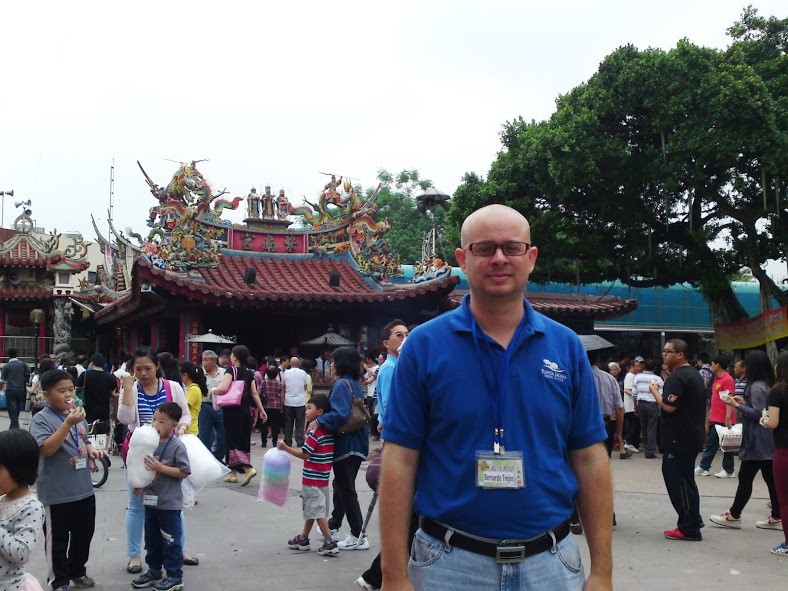首頁 > 傑出校友 > 歷屆傑出校友
校友專訪

Bernardo Trejos
Ph.D. in Rural Planning and Development, DTAIC, NPUST
Current position: Assistant Professor
Department of International Tourism and Hospitality
International College, I-Shou University
1. 目前工作主要的職務內容有哪些?
1. What are the major duties for your current position?
Answer:
I just began a feed additive company (Master Technology), which dedicates to import products from Taiwan. Therefore, my major duties in this current position are:
1. Find new customers to try our feed additives.
2. Set up experiments in the clients’ farms so they can see how good the feed additives we distribute are.
2. 請問您是如何進入這個工作?
2. How did you get this job?
Answer:
The Department found my information in the NPUST database and contacted me by e-mail. I told them that I was looking for a department where I could fit well, given my academic background, field of expertise and teaching experience. I was given an interview that went very well. Most of the faculty in the International College at I-Shou University are foreigners, so there was no problem in understanding each other’s needs and aspirations.
3. 目前這個職務所必須具備的能力有哪些?
3. What are the required capabilities for your current position?
Answer:
In the short run, it is very important to have good pedagogical skills, because ISU is a teaching university. Students want to learn practical skills and applications for what they learn in class. They don’t just want to learn the theory and repeat it in an exam. In the long run, research is the area that must receive most of your attention, since promotion depends on it.
4. 若選擇要進入這個職業的員工,您覺得這個員工要具備哪些重要的能力(or人格特質)?為什麼?
4. If you are hiring, what are the critical capabilities (or personalities) for your new employee? Why?
Answer:
At the moment, most tourism departments have a shortage of faculty that can teach hospitality courses. Professionals that can teach restaurant management and food safety are highly sought after. And this shortage exists not only in Taiwan, but around the world. I hope DTAIC can collaborate in the solution to this problem and create linkages with the Department of Hotel and Restaurant Management, so that this critical link between agriculture and the service sector can be researched and taught.
5. 以上您所說的那些能力or特質,是否就是您選人準則?哪些是重要的選人標準?
5. Regarding to above mentioned capabilities or personalities, are they your selecting criteria? Or what are the most important selecting criteria among them?
Answer:
If you want to become a faculty member at a university, you will need a Ph.D. degree that is related to the department. A department hires faculty members because they need someone to teach several courses. A good candidate should have a broad range of courses that she/he can teach. On the other hand, there is a lot of freedom in terms of the research area, so that is usually not a concern.
6. 這個工作是否具有挑戰性?覺得有哪些方面是具有挑戰性的?(可以分享一、兩個例子嗎?)
6. Is your current job challenging? If yes, in which aspects? (please share couple examples with us)
Answer:
Sure! I think the biggest challenge is how university students are increasingly interested in the practical aspects of their career. In the past, students would gladly study the theoretical aspects of their field and memorize them for their exams. Now, students want to know how all this theory is applied and how they can take advantage of the knowledge they have acquired in their professional careers. Another challenge is balancing teaching and research, so that the former does not take most of your time and affect the latter.
7. 您覺得有哪些特質or條件是讓您成功的關鍵因素?
7. What are the unique characteristics or capabilities of you make you successful in your career life?
Answer:
Sure! I think the biggest challenge is how university students are increasingly interested in the practical aspects of their career. In the past, students would gladly study the theoretical aspects of their field and memorize them for their exams. Now, students want to know how all this theory is applied and how they can take advantage of the knowledge they have acquired in their professional careers. Another challenge is balancing teaching and research, so that the former does not take most of your time and affect the latter.
8. 請您回想一下,在學校您都學些什麼(包括:課內、課外—ex:社團活動、經歷)?哪些是對踏入職場與畢業後的發展很有幫助?
8. When you recall, what did you learn in schools? (including on and off campus experiences). Among them, what are very helpful to your career life after graduation?
Answer:
I think that DTAIC gives a Ph.D. student a lot of academic freedom while still pushing students for excellence. This has been very helpful for me in my career. There is also a good environment of discussion and constructive criticism among students and faculty. While I was enrolled in NPUST, I worked very hard every day, seldom taking a day off. I tried to improve myself every day, however small this improvement turned out to be. I took a long time reading the classic literature as well as the most recent research. Once you start teaching full time, it’s very hard to have the time to read calmly, so seizing your time as a student is very important.
9. 給想要進入此產業(職業)的學弟妹一些建議,哪些可在學校先做準備?
9. What do you suggest the juniors to learn or prepare in school for entering your industry?
Answer:
It is very important to dedicate your years in post-graduate education learning where the academic discussion is going and making a contribution to it. I believe many Ph.D. students set their target too low, and then this affects their career in the long run.
10. 準備求職時,應該注意哪些事?
10. When applying for a job, what are noteworthy?
Answer:
Applying for a job requires training, in the sense that you must prepare for the application process. It’s important to start applying before you graduate, so that you learn what to write and what not to write on your CV, as well as what to say and what not to say during an interview. The first interview will probably not come out as expected. It’s only after you’ve done a few interviews that you can take advantage of the opportunities that arise.

Current position: Assistant Professor
Department of International Tourism and Hospitality
International College, I-Shou University
1. 目前工作主要的職務內容有哪些?
1. What are the major duties for your current position?
Answer:
I just began a feed additive company (Master Technology), which dedicates to import products from Taiwan. Therefore, my major duties in this current position are:
1. Find new customers to try our feed additives.
2. Set up experiments in the clients’ farms so they can see how good the feed additives we distribute are.
2. 請問您是如何進入這個工作?
2. How did you get this job?
Answer:
The Department found my information in the NPUST database and contacted me by e-mail. I told them that I was looking for a department where I could fit well, given my academic background, field of expertise and teaching experience. I was given an interview that went very well. Most of the faculty in the International College at I-Shou University are foreigners, so there was no problem in understanding each other’s needs and aspirations.
3. 目前這個職務所必須具備的能力有哪些?
3. What are the required capabilities for your current position?
Answer:
In the short run, it is very important to have good pedagogical skills, because ISU is a teaching university. Students want to learn practical skills and applications for what they learn in class. They don’t just want to learn the theory and repeat it in an exam. In the long run, research is the area that must receive most of your attention, since promotion depends on it.
4. 若選擇要進入這個職業的員工,您覺得這個員工要具備哪些重要的能力(or人格特質)?為什麼?
4. If you are hiring, what are the critical capabilities (or personalities) for your new employee? Why?
Answer:
At the moment, most tourism departments have a shortage of faculty that can teach hospitality courses. Professionals that can teach restaurant management and food safety are highly sought after. And this shortage exists not only in Taiwan, but around the world. I hope DTAIC can collaborate in the solution to this problem and create linkages with the Department of Hotel and Restaurant Management, so that this critical link between agriculture and the service sector can be researched and taught.
5. 以上您所說的那些能力or特質,是否就是您選人準則?哪些是重要的選人標準?
5. Regarding to above mentioned capabilities or personalities, are they your selecting criteria? Or what are the most important selecting criteria among them?
Answer:
If you want to become a faculty member at a university, you will need a Ph.D. degree that is related to the department. A department hires faculty members because they need someone to teach several courses. A good candidate should have a broad range of courses that she/he can teach. On the other hand, there is a lot of freedom in terms of the research area, so that is usually not a concern.
6. 這個工作是否具有挑戰性?覺得有哪些方面是具有挑戰性的?(可以分享一、兩個例子嗎?)
6. Is your current job challenging? If yes, in which aspects? (please share couple examples with us)
Answer:
Sure! I think the biggest challenge is how university students are increasingly interested in the practical aspects of their career. In the past, students would gladly study the theoretical aspects of their field and memorize them for their exams. Now, students want to know how all this theory is applied and how they can take advantage of the knowledge they have acquired in their professional careers. Another challenge is balancing teaching and research, so that the former does not take most of your time and affect the latter.
7. 您覺得有哪些特質or條件是讓您成功的關鍵因素?
7. What are the unique characteristics or capabilities of you make you successful in your career life?
Answer:
Sure! I think the biggest challenge is how university students are increasingly interested in the practical aspects of their career. In the past, students would gladly study the theoretical aspects of their field and memorize them for their exams. Now, students want to know how all this theory is applied and how they can take advantage of the knowledge they have acquired in their professional careers. Another challenge is balancing teaching and research, so that the former does not take most of your time and affect the latter.
8. 請您回想一下,在學校您都學些什麼(包括:課內、課外—ex:社團活動、經歷)?哪些是對踏入職場與畢業後的發展很有幫助?
8. When you recall, what did you learn in schools? (including on and off campus experiences). Among them, what are very helpful to your career life after graduation?
Answer:
I think that DTAIC gives a Ph.D. student a lot of academic freedom while still pushing students for excellence. This has been very helpful for me in my career. There is also a good environment of discussion and constructive criticism among students and faculty. While I was enrolled in NPUST, I worked very hard every day, seldom taking a day off. I tried to improve myself every day, however small this improvement turned out to be. I took a long time reading the classic literature as well as the most recent research. Once you start teaching full time, it’s very hard to have the time to read calmly, so seizing your time as a student is very important.
9. 給想要進入此產業(職業)的學弟妹一些建議,哪些可在學校先做準備?
9. What do you suggest the juniors to learn or prepare in school for entering your industry?
Answer:
It is very important to dedicate your years in post-graduate education learning where the academic discussion is going and making a contribution to it. I believe many Ph.D. students set their target too low, and then this affects their career in the long run.
10. 準備求職時,應該注意哪些事?
10. When applying for a job, what are noteworthy?
Answer:
Applying for a job requires training, in the sense that you must prepare for the application process. It’s important to start applying before you graduate, so that you learn what to write and what not to write on your CV, as well as what to say and what not to say during an interview. The first interview will probably not come out as expected. It’s only after you’ve done a few interviews that you can take advantage of the opportunities that arise.


